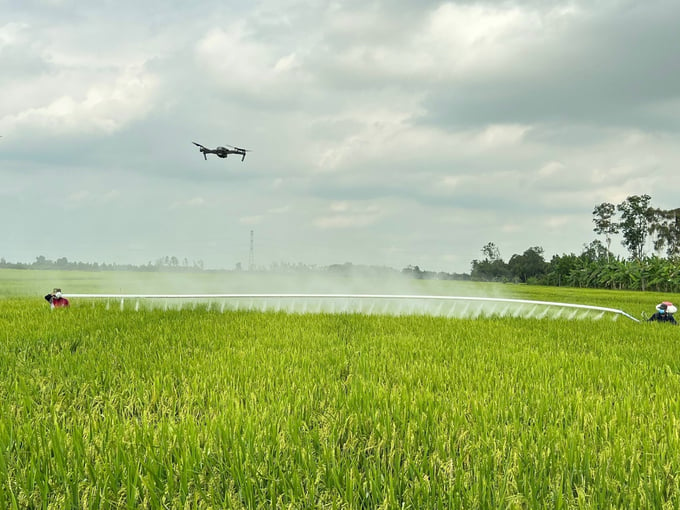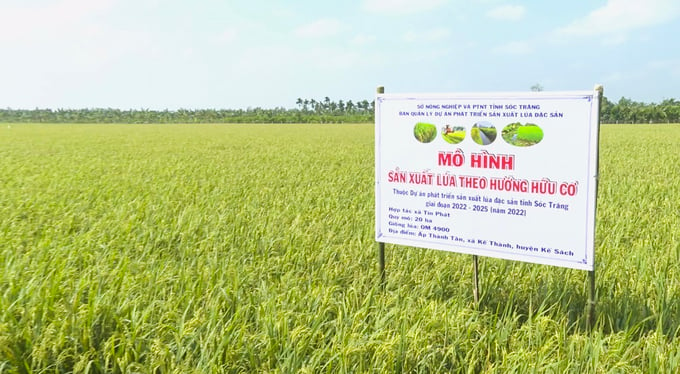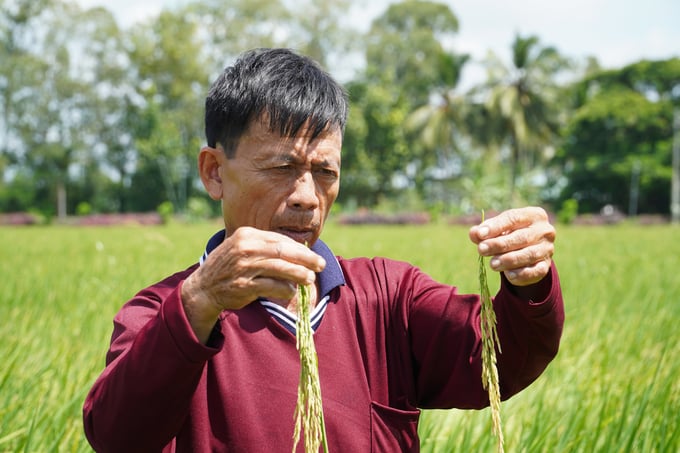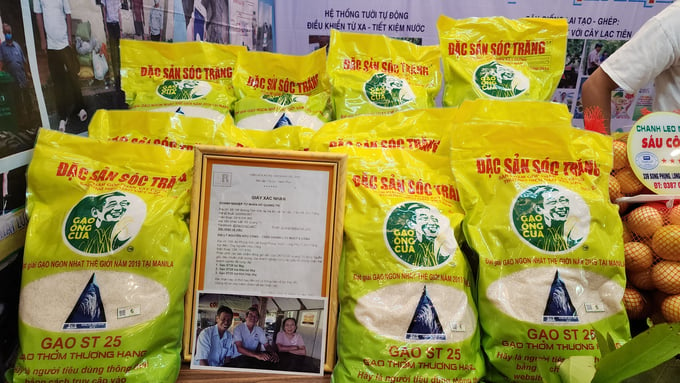June 16, 2025 | 14:07 GMT +7
June 16, 2025 | 14:07 GMT +7
Hotline: 0913.378.918
June 16, 2025 | 14:07 GMT +7
Hotline: 0913.378.918
Established in November 2021, Vinh Loi Agricultural Cooperative in Vinh Loi commune, Thanh Tri district, Soc Trang province is considered a young cooperative, taking the pioneering path of organic rice production in the province. With an initial membership of 22, the cooperative produced approximately 50 hectares of fragrant and specialty ST rice varieties.
During the late summer-autumn crop of 2021, Mr. Nguyen Van Ut, Director of Vinh Loi Agricultural Cooperative, encouraged three commune members to experiment with producing 5 hectares of organic rice. The rice yield was noticeably lower compared to that of traditional farming in the initial transition phase, reaching only 4 to 5 tons per hectare.
By the end of 2021, with support from the Mekong Organics group under the Research and Development Center for Rural Development, An Giang University, Vinh Loi Agricultural Cooperative received assistance in establishing a commercial organic rice production model in compliance with the USDA/EU standards.

Organic rice production area utilizing natural minerals belonging to Vinh Loi Agricultural Cooperative in Thanh Tri district, Soc Trang province. Photo: Kim Anh.
At the beginning of the summer-autumn crop of 2022, 20 members of the Vinh Loi Agricultural Cooperative sowed ST25 rice on approximately 30 hectares of production area. Advanced agricultural practices were applied the production area, including pest management through air-sprayed natural mineral fertilizers in compliance with international organic standards, the use of high-quality rice varieties, and organic fertilizers as a base dressing for rice.
Notably, the cooperative has established a field management team tasked with monitoring the production process of local members to ensure uniformity as well as a chemical-free input.
After four crops of organic rice production in compliance with USDA/EU standards, pest infestations in the fields have significantly decreased, and the rice plants exhibit strong growth. Additionally, a positive transformation in yield has been reported. Accordingly, farmers saw an increase to 5.2 tons per hectare in rice yield, which is comparable to traditional production methods.
Thanks to the clean rice production model with high quality standards, Vinh Loi Agricultural Cooperative has successfully linked its products with several organic rice export businesses at prices higher than the market by 200 to 400 Vietnamese dong per kilogram. Regarding long-term development plans, obtaining an organic certification will help the cooperative raise the price of organic rice by an additional 1,500 to 2,000 Vietnamese dong per kilogram.
Regarding the development direction of organic rice production, Mr. Nguyen Van Ut reported that businesses currently have high demand for this product. Accordingly, the cooperative's starting point of organic rice production has facilitated the transition process. In addition to investments in completing the irrigation system, Soc Trang province's agricultural sector also supported Vinh Loi Agricultural Cooperative in building a closed pumping station for organic rice production.
Mr. Ut is currently negotiating prices with businesses to establish a purchasing linkage for cooperative members. A successful negotiation will result in the cooperative's expansion of organic production area to 60 to 70 hectares.
"When the cooperative is confident in its quality of organic rice, we will apply for domestic organic certification, paving the way for international export certification. The cooperative's policy is not to accept many members, only admitting those who agree and are willing to participate in organic rice production," Mr. Ut stated.

Soc Trang province currently has over 5,000 hectares of organic rice production area. Photo: Kim Anh.
In addition, the cooperative also leverages support from various domestic and international programs and projects to develop organic rice production. This assistance aids cooperative members in training, technology transfer, and advanced production practices. It is an effective method of communication that fosters a high level of consensus with the cooperative's approach among community members.
In 2021, Soc Trang Provincial People's Committee approved the Project for the Development of Organic Farming from 2022 to 2025, with a vision towards 2030, focusing primarily on target production areas, including rice, fruit trees, livestock, and aquaculture.
According to the project's objectives, Soc Trang province will establish 32 certified organic agricultural production models by 2025, covering an organic production area of over 210 hectares. Furthermore, the certified organic production area will be further developed and expanded to reach over 400 hectares by 2030.
In addition to the development of organic rice, the specialty rice production project in Soc Trang province, which was implemented since 2012, has achieved considerable success. Mr. Tran Vinh Nghi, Director of Soc Trang province's Sub-Department of Crop Production and Plant Protection, noted that local rice production performed poorly in the past with only one crop per year. After recognizing these difficulties, the province's agricultural sector began a large-scale transformation.
Namely, local agricultural officials actively engaged in research projects, selection programs, and collaborations with institutes and schools to identify specialty rice varieties suitable for the soil conditions in Soc Trang province.

Soc Trang province has set the goal of developing specialty and organic rice production. Photo: Kim Anh.
Between 2012 and 2015, during the early stages of the specialty rice production and development project, Soc Trang province successfully produced 127,000 hectares of specialty rice, surpassing the initial target of 70,000 hectares. Additionally, farmers received training on the production process, techniques for producing purebred rice seeds, and certifications to enhance rice breeding capabilities. Advanced scientific and technical models such as IPM, "1 must, 5 reductions," "3 reductions, 3 increases," organic production, and VietGAP were simultaneously implemented across fields.
Subsequently, the quality of rice produced within the project area met market demand. Most notably, ST5 rice was priced at 500 to 700 Vietnamese dong per kilogram higher compared to regular rice, ST20 at 1,200 to 1,500 Vietnamese dong per kilogram higher, and Tai Nguyen rice at 1,000 to 1,200 Vietnamese dong per kilogram higher.
Following this success, Soc Trang province expanded and developed the specialty rice production and development project from 2016 to 2020, marked by the creation of the "Soc Trang Fragrant Rice" brand to enhance the value of the local rice products in the domestic and international markets. During this time, the ST24 rice variety was recognized as one of the top three best-tasting rice varieties in the world. Two years later, the ST25 rice was also recognized as the world's best-tasting rice in 2019.
Rice production in Soc Trang province underwent a significant transformation process with the implementation of production-consumption linkages, the establishment of large fields in linkage with businesses. Farmers in the province were encouraged to apply and disseminate technologies in processing, preservation, and packaging of rice products.
As a result, a stable specialty rice production area exceeding 150,000 hectares was formed in seven districts and towns including Thanh Tri, My Tu, Chau Thanh, Long Phu, Tran De, My Xuyen, and Nga Nam. Additionally, 54 agricultural cooperatives and 371 cooperative groups entered into production and consumption contracts with businesses on an area exceeding 53,000 hectares.
The specialty rice production and development project in Soc Trang province is bolstering its growth in the third phase from 2022 to 2025, with the goal of maintaining and expanding the specialty rice production area to 195,000 hectares by 2025, focusing on the ST rice group.

The ST24 and ST25 rice varieties in Soc Trang province have been recognized as the best-tasting rice in the world, contributing to enhancing their value in the international market. Photo: Kim Anh.
On the other hand, 21 raw material areas for specialty rice production will be established under the project, each with an area of 1,000 hectares and linked consumption. Furthermore, the project will focus on consolidating and improving the quality of 50 specialty rice production cooperatives. The project also aims to develop 80 specialty rice production models adapted to climate change in association with product consumption, and establish 5 brands for specialty rice production cooperatives in Soc Trang province.
The development of specialty rice production is being implemented across nine local districts, towns, and cities. Namely, Soc Trang province strives to achieve a rice yield of 2 million tons by the end of 2023, with specialty rice and high-quality rice accounting for over 92%.
Soc Trang province currently has over 5,000 hectares of organic rice production area. The local Department of Agriculture and Rural Development has identified the importance of calling for business investment, cooperation, and establishing organic raw material areas in association with product consumption.
In reality, the market demand for organic products is substantial despite marginal differences in prices compared to traditionally-produced items. This makes the risk of organic rice being equated in price considerably higher. As a result, acquiring international certifications for organic rice production will contribute to increasing the value and quality of products for the domestic market as well as export.
Translated by Nguyen Hai Long
![Turning wind and rain into action: [4] Bringing climate bulletins to remote and isolated areas](https://t.ex-cdn.com/nongnghiepmoitruong.vn/608w/files/linhnhp/2025/06/14/1152-z6704423696987_15fd32ffc26d590d204d520c9dac6786-nongnghiep-151141.jpg)
(VAN) The Vietnam Agriculture and Nature Newspaper interviewed Mr. Vu Thai Truong, Acting Head of Climate Change and Environment at UNDP Vietnam, to gain deeper insight into how climate bulletins are delivered to farmers.

(VAN) In Tien Giang, a high-tech shrimp farm has developed a distinctive energy-saving farming model that has yielded promising results.
![Turning wind and rain into action: [3] 300.000 farmers benefit from agro-climatic bulletins](https://t.ex-cdn.com/nongnghiepmoitruong.vn/608w/files/news/2025/06/12/e5a48259d6a262fc3bb3-nongnghiep-125122.jpg)
(VAN) The agro-climatic bulletin has become a valuable tool for farmers in the Mekong Delta. After more than five years of implementation, the initiative is gradually being expanded nationwide.
![Turning wind and rain into action: [2] Providing forecasts to the people](https://t.ex-cdn.com/nongnghiepmoitruong.vn/608w/files/news/2025/06/12/e5a48259d6a262fc3bb3-nongnghiep-103927.jpg)
(VAN) In addition to improving the quality of hydrometeorological forecasts, putting forecast bulletins into practical use is crucial for production and disaster prevention.

(VAN) Blue carbon is receiving attention for its rapid absorption capacity and vast potential. It represents a promising nature-based solution to respond to climate change.
/2025/06/11/3507-1-161904_583.jpg)
(VAN) Seagrass beds and coral reefs serve as 'cradles' that nurture life in the ocean depths, creating rich aquatic resources in Vietnamese waters.
![Turning wind and rain into action: [1] Forecasting for farmers](https://t.ex-cdn.com/nongnghiepmoitruong.vn/608w/files/news/2025/06/11/e5a48259d6a262fc3bb3-nongnghiep-111919.jpg)
(VAN) Weather is no longer just a matter of fate. Forecasts have now become an essential companion for farmers in every crop season.